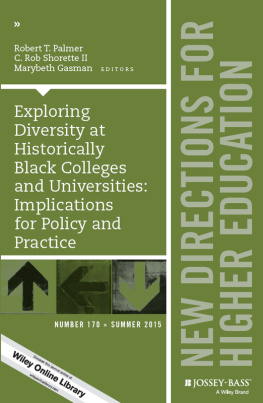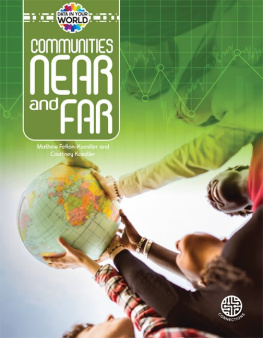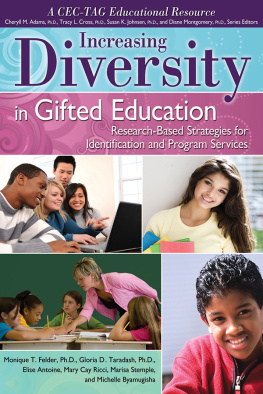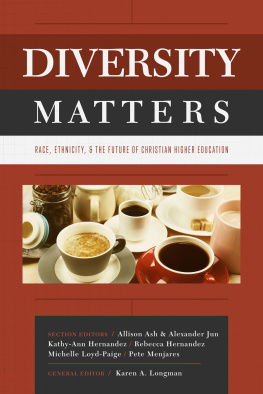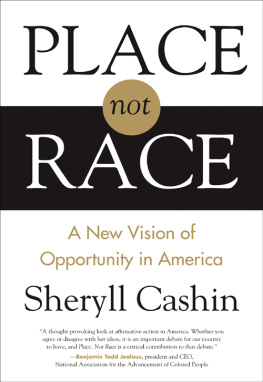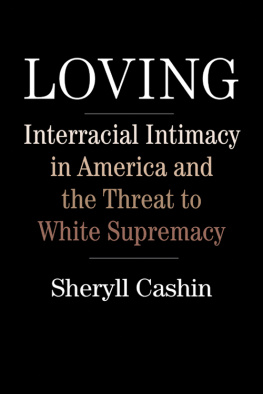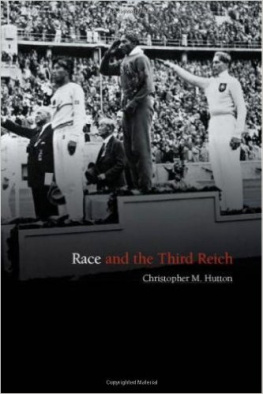Library of Congress Cataloging-in-Publication Data
Park, Julie J., 1982
When diversity drops : race, religion, and affirmative action in higher education / Julie J. Park.
pages cm
Includes bibliographical references (pages) and index.
ISBN 9780-813561691 (hardcover : alk. paper)ISBN 9780-813561684 (pbk. : alk. paper)ISBN 9780-813561707 (e-book)
1. MinoritiesEducation (Higher)United States. 2. Affirmative action programs in educationUnited States. 3. MulticulturalismUnited States. 4. United StatesRace relations. 5. Inter-Varsity Christian Fellowship. I. Title.
LC3727.P24 2013
378.1'9829dc232012040307
A British Cataloging-in-Publication record for this book is available from the British Library.
Copyright 2013 by Julie J. Park
All rights reserved
No part of this book may be reproduced or utilized in any form or by any means, electronic or mechanical, or by any information storage and retrieval system, without written permission from the publisher. Please contact Rutgers University Press, 106 Somerset Street, New Brunswick, NJ 08901. The only exception to this prohibition is fair use as defined by U.S. copyright law.
Visit our website: http://rutgerspress.rutgers.edu
When I was in college, I visited a childhood friend who was attending Stanford University. One night she invited me to a group discussion on race that was being hosted by InterVarsity Christian Fellowship (IVCF), an evangelical student organization that she attended regularly. When we got there, we were asked to break into small groups by race and, within race, national origin. The room was filled with subgroups of Asian Americans, and my friend and I walked over to the Korean group. Once assembled, our group began to discuss how strange it was that we were suddenly being forced to clump together as Koreans even though our experiences were so varied. Our group included Korean immigrants, a Korean who had grown up in Hong Kong, Korean Americans who had grown up in Korea, a Korean from Hawaii who did not understand why people on the mainland made such a big deal about race, and my friend and I, who were Korean Americans from Ohio. (Some probably saw our experience as being the most foreign.) When everyone in the room gathered together again and each small group shared insights from its discussion time, I was especially struck by the stories shared by the small group of multiracial students, who explained that they never knew which group they might fit into.
Facilitators encouraged students to talk between groups, to share experiences with people of other races and ethnicities. One of these facilitators, a Chinese American woman, told us that she had been called out by a black friend when she had offhandedly commented, Black people sing so well, thus learning a lesson about the dangers of positive stereotyping. Then an Asian American female student cautiously shared a stereotype that she had heard about Korean American men: that they beat their wives. A few other students nodded in recognition. Now Jack, a Korean American from Los Angeles, joined the conversation. He had a strong emotional reaction to that remark, saying how hurtful it was to hear such comments even though he recognized that domestic violence was pervasive within the community. His voice broke as he spoke, and someone passed him a Kleenex box. As the facilitators rushed to diffuse the intensity of the situation, I began to wonder why had I never experienced such raw, honest dialogue during college. What were the students taking from this discussion? And why was this strange forum occurring at a Christian student organization of all places?
Years later, as a graduate student interested in understanding how college students experience race in multiethnic environments, these same questions brought me to a different IVCF chapter, which I had noticed was the most racially diverse campus fellowship at an institution where most students worshipped in racially homogeneous groups. My initial plan was to study how IVCF had made that diversity possible and how students were reacting to the experience of participating in a multiethnic community. Eventually, however, I began to hear a puzzling repetition, a remark along the lines of Were diverse, but not as diverse as we used to be. That repeated comment pushed me to wonder what was happening to IVCF and why. Realizing that I did not want to tell the story of IVCF in a single snapshotthat is, as a group that had made it as a diverse organizationI decided to study its evolution by documenting its journey over an approximately sixteen-year time period. Moreover, I knew I could not understand IVCF just by studying the organization as an isolated entity; I needed to understand it in the broader contexts of the campus racial climate at what Im calling, for reasons of anonymity, California University (CU) and demographic shifts in California public education due to Proposition 209, which in 1996 banned affirmative action. This book is my best attempt to capture that story.
When Diversity Drops went to press at a unique time point in history, shortly after the Supreme Court heard arguments in Fisher v. University of Texas but prior to the announcement of the verdict. By the time the book is released, the landscape for race-conscious admissions policies may dramatically change. Even if the Supreme Court ruling in Grutter v. Bollinger is upheld, the future of race-conscious admissions policies will likely remain uncertain. Regardless of the verdict, my hope is that this book will be a helpful resource to answer questions about what can happen in student life when an institution loses racial diversity, which can happen for any number of reasons, including, but not limited to, a ban on affirmative action.
In January 2006, when I started visiting the IVCF at CU for site observations, I could scarcely imagine that the notes I was jotting down would become part of a book. I am grateful for the many people who have traveled with me along the way. My dissertation committee at UCLA provided much-needed early validation of the project: Mitchell J. Chang, Patricia McDonough, Walter Allen, and Robert Chao Romero. I especially thank Mitch and Pat for their mentorship from day one and the additional guidance of Sylvia Hurtado, Linda Sax, and Robert Rhoads during my studies. I want to thank UCLA Higher Education and Organizational Change and the UCLA Higher Education Research Institute for offering me tremendous places to grow as a graduate student. Working on the Spirituality in Higher Education Project gave me the chance to understand the dynamics of college student religiosity and spirituality from a quantitative angle, and I thank Sandy Astin and Lena Astin for their mentorship. I also thank the UCLA Institute of American Cultures, the Spencer Foundation, and the Louisville Institute for funding fieldwork and graduate study. Chapter 4 was published previously in the Review of Higher Education 35, no. 4 (2012): 567593, and I thank the John Hopkins University Press for allowing me to include the material in this book.
Colleagues and friends at the University of Maryland (UMD), College Park, and Miami University welcomed me and helped me navigate faculty life. I particularly want to thank Susan Komives, Marylu McEwen, Stephen Quaye, Kimberly Griffin, Michelle Espino, Marcia Baxter Magolda, Peter Magolda, Elisa Abes, Mark Giles, Kathy Goodman, and Dick Nault. I am especially grateful to the Student Affairs Concentration community at UMD and my supportive colleagues in the Department of Counseling, Higher Education, and Special Education and College of Education. I thank Tina Chen and Shozo Kawaguchi for their early mentorship and continued friendship. Over the years, many patient friends have let me share ideas and theories related to race and IVCF: Calvin Chen, Sarah Ihn, Jennifer Kim, Oiyan Poon, Sophia Lai, Jonathan Lew, Warren Chiang, Gloria Koo, and Janna Louie. Special thanks to Steph Rue for bringing me to that discussion at Stanford so many years ago and to dear friends from the Calvin Seminar on the Power of Race in American Religion, who patiently listened to my attempts to articulate the core arguments of this book, which were truly powered by our daily after-lunch ice cream. I thank Michael Emerson for his leadership of our group. Jonathan Wang, Peter Magolda, Jerry Park, Alyssa Bryant Rockenbach, Maria Ledesma, and Lisa Millora read the entire manuscript along the way, and I cannot thank them enough. James Bielo, Ryon Cobb, Sharon Kim, and Sam Museus offered valuable feedback, and Katie Kwon was invaluable in pulling together the reference list. I am grateful to Katie Keeran at Rutgers University Press for her support of the project and for walking me through the process as a first-time author. I also thank the anonymous external reviewer whose comments for revision were most helpful.




